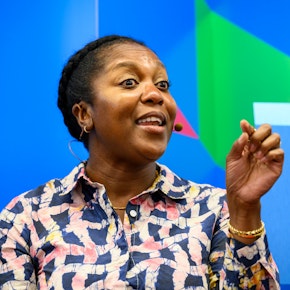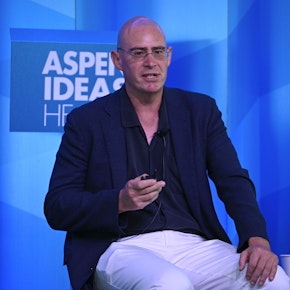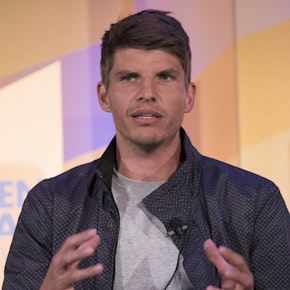Health
Nutrition

The communities we call home and the ways we live greatly influence health and longevity. By studying “Blue Zones” around the globe, Dan Buettner has uncovered the macro-level secrets that lead long and vigorous lives. At the individual level, Dean Ornish presents new evidence that lifestyle choices can alter the course of Alzheimer’s disease, heart disease, cancer, and ch...

The health benefits of a nutritious diet are well-established, but just telling people to eat more plant-based foods and less unhealthy fat isn’t enough to reduce the toll of chronic diseases. A growing body of research supports a much more systematic approach, woven into the fabric of healthcare, to leverage the medicinal power of food. Medically tailored meals designed t...

From anxiety to focus to memory to joy, physical activity has a truly astounding number of benefits on our brain’s anatomy, physiology, and function. In this interactive session, come prepared to experience real brain change, and walk away with science-based tools you can use every day to improve your brain function.

Despite high demand for nutritious foods, many Americans experience gaps, challenges, and barriers when it comes to access and agency over their nutrition. How can the public and private sector work together to unlock and advance a more inclusive state of nutrition for all? Presented by Danone

Environmental stewardship has become as much a watchword in the business sector as it has among activists and advocates. When corporate executives start talking about the importance of ecosystems, regenerative agriculture, and responsible product sourcing, and NGOs promote innovative financing mechanisms that forgive national debt in exchange for funding conservation activ...

If you want to make an omelet, you’ve got to deal with a broken food system—one that is a massive contributor to climate change, that leaves populations hungry or full of non-nutritious calories, and that exploits land, labor, and species. Award-winning food writer Mark Bittman has a plan to provide affordable, nutritionally and environmentally sound food for everyone, cre...

Almost 110 billion pounds of food, roughly 40% of the nation’s total food supply, go to waste in the United States every year, yet more than 38 million Americans lack reliable access to affordable, nutritious meals. Can we create a win-win-win that bridges the gap between waste and hunger while supporting struggling local restaurants that are often community mainstays? Ret...

In some communities, the laundromat has become a place to get a mammogram, a blood test, or a skin cancer screening. Mental health counseling is being offered at churches, health insurance sign-ups are taking place in libraries and parks, and barbers are raising awareness of hypertension and the risk of colorectal cancer as they snip and shave. When the doctor’s office is...

Knowledge about the human microbiome, those trillions of bacteria, viruses, and other microbes that inhabit our bodies, is revolutionizing medicine just as mapping the human genome continues to do. Indeed, what we are learning could take us even further because the microbiome can be altered by diet, exercise, and stress control. Computational biology, DNA sequencing, and o...

Williams, Jordan, James, Brady. They’re among a growing class of the superstar athletes delivering career-best performances well past what's been considered peak age for their sports. As this phenomenon becomes more common, it begs the questions how and why now? How are experience and maturity winning out over inevitable, natural physical decline? Athletes in the 30s and 4...

For decades, diet and exercise fads have promised to shrink waistlines, build muscle, detoxify, and so on. But evidence is mounting that there’s no one diet or routine that works for everyone. Researchers are experimenting with AI to determine personalized nutrition algorithms based on an individual’s health, lifestyle, physiology, and immune system. Christie Aschwanden, a...

To address the food deserts throughout many of New York City’s low-income communities, the Laurie M. Tisch Illumination Fund (LMTIF) leveraged public and private partnerships to build healthy food initiatives focused on contributing vitality, economic opportunity, and health equity. Rockefeller Philanthropy Advisors (RPA) and LMTIF will release new findings on the impact o...

A healthy community is characterized not only by the absence of illness but by attributes that promote well-being and enable a high quality of life. While social policy and public and private investments are important contributors, the broad-based engagement of local people is also key. Across the US and globally, people are taking community-building into their own hands,...

Human beings swarm with bacteria, viruses, and fungi — trillions and trillions of them, inhabiting virtually every part of our bodies. Known collectively as the microbiome, they play a vital role in keeping the immune system strong, synthesizing nutrients, maintaining heart health, and so much more. But when these synergistic communities of microbes are disrupted, we becom...

Federal funds could not be used to pay for sugar-sweetened beverages under the Supplemental Nutrition Assistance Program (SNAP, formerly called food stamps), if recommendations from the Bipartisan Policy Center are adopted. In its 2018 report, Leading with Nutrition, the center calls for restrictions and incentives that would recast SNAP as a tool for healthy eating. Other...

Almost 10% of the US population lives with diabetes – that’s 30 million people, with another 84 million diagnosed with prediabetes. The devastating disease can shorten lives and increase the risk of heart disease, stroke, vision loss, and the need for limb amputation – but it can also be managed with lifestyle changes and exciting new therapeutic advances. Novel drugs and...

College presents opportunities for students to test their wings, explore new relationships, pursue their personal best, and develop an enduring passion for learning. Often the first opportunity for real independence, the college years can also pose serious health risks — among them, mental health issues, binge drinking, sexually transmitted diseases, date rape, infections,...

Visionary architects, artists, and builders are using cutting-edge design to transform homes, workplaces, schools, neighborhoods, and parks. Recognizing the health-promoting power of good design, their blueprints call for farmers’ markets and recreational fields on hospital grounds; planning processes that revitalize challenged communities by engaging local people as colla...

A passion for food — growing it, cooking it, and eating it — has become one of the favorite pastimes of countless people. Did it all begin with James Beard? Learn why that claim is made in the new PBS American Masters documentary, James Beard: America’s First Foodie. Following the film, Corby Kummer, food writer for The Atlantic, will lead a panel discussion with two of Am...

For thousands of years, we’ve relied on animals to turn plants into meat. Steaks, burgers, and chicken are staples of the American diet. The sustainable food movement that gave rise to grass-fed beef and free-range chicken is now going a step further—a big step further—with the introduction of plant-based, mass-market solutions to replace animal protein. Are these new pr...

